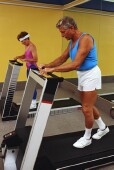- Could Your Grocery Store Meat Be Causing Recurring UTIs?
- Are You Making This Expensive Thermostat Error This Winter?
- Recognizing the Signs of Hypothyroidism
- 10 Strategies to Overcome Insomnia
- Could Artificial Sweeteners Be Aging the Brain Faster?
- Techniques for Soothing Your Nervous System
- Does the Water in Your House Smell Funny? Here’s Why
- Can a Daily Dose of Apple Cider Vinegar Actually Aid Weight Loss?
- 6 Health Beverages That Can Actually Spike Your Blood Sugar
- Treatment Options for Social Anxiety Disorder
Short Walks Can Offset Long Stretches of Sitting


Taking really short but frequent walks can counteract the harm caused by sitting for long periods of time, a new study suggests.
The researchers found that even just a five-minute stroll can help.
“American adults sit for approximately eight hours a day,” study author Saurabh Thosar, now a postdoctoral researcher at Oregon Health & Science University, said in an Indiana University news release. “The impairment in endothelial function is significant after just one hour of sitting. It is interesting to see that light physical activity can help in preventing this impairment.”
According to background information from Indiana University, sitting for a prolonged period of time can cause blood to pool in the legs. This happens because muscles are not contracting and pumping blood to the heart as effectively. As a result, the ability of blood vessels to expand from increased blood flow can become impaired. Being sedentary is also linked to high cholesterol and a larger waistline, which increase the risk for heart and metabolic disease.
“There is plenty of epidemiological evidence linking sitting time to various chronic diseases and linking breaking sitting time to beneficial cardiovascular effects, but there is very little experimental evidence,” said Thosar, who was a doctoral candidate at IU’s School of Public Health-Bloomington when the study was conducted. “We have shown that prolonged sitting impairs endothelial function, which is an early marker of cardiovascular disease, and that breaking sitting time prevents the decline in that function.”
The researchers examined the effects of three hours of sitting on 11 healthy men who were not obese. The men, who ranged in age from 20 to 35 years old, participated in two trials.
First, the men sat for three hours without moving their legs. When the study began and once every hour afterwards, the function of their femoral artery was measured with a blood pressure cuff and ultrasound technology.
During the second trial, the men sat for three hours but also walked on a treadmill for five minutes after 30 minutes, 1.5 hours and 2.5 hours. The men walked at a slow pace of 2 miles per hour. The function of their femoral artery was again measured with a blood pressure cuff and ultrasound technology.
Overall, the researchers found, the ability of the arteries in the legs to expand was reduced by as much as 50 percent after just one hour of sitting. The men who walked for five minutes for each hour they spent sitting, however, had no reduction in the function of their arteries during the three-hour period.
The researchers concluded that the increased muscle activity and blood flow from the small amount of exercise offset the negative impacts of sitting.
The research was published Sept. 8 in the journal Medicine & Science in Sports & Exercise.
More information
The American Heart Association provides more information on the health benefits of walking.
Source: HealthDay
Copyright © 2026 HealthDay. All rights reserved.










